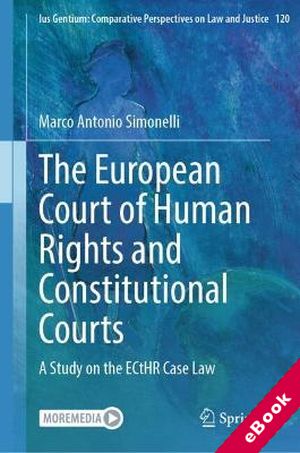
The device(s) you use to access the eBook content must be authorized with an Adobe ID before you download the product otherwise it will fail to register correctly.
For further information see https://www.wildy.com/ebook-formats
Once the order is confirmed an automated e-mail will be sent to you to allow you to download the eBook.
All eBooks are supplied firm sale and cannot be returned. If you believe there is a fault with your eBook then contact us on ebooks@wildy.com and we will help in resolving the issue. This does not affect your statutory rights.
This book investigates the relationship between the European Court of Human Rights (ECtHR) and national constitutional courts by providing a more general assessment as seen from the former's perspective. Adopting an empirical approach, the book reviews all the case law of the ECtHR in which constitutional courts are cited. This represents more than 3,000 rulings spanning more than fifty years, from the establishment of the Strasbourg Court in 1959 - when only three constitutional courts were active - to 1 January 2023, when there were more than thirty active constitutional courts in the Council of Europe's Member States.
This wide-ranging empirical study pursue several different goals. First, the book provides a quantitative assessment of the relevance of constitutional courts in ECtHR case law and presents weighted data on the frequency and chronological evolution of the citations, as well as individual statistics for each national constitutional court. Second, it assesses the extent of the rationalisation of constitutional justice systems conducted by the Strasbourg Court and defines the standards and elements of the right to a fair constitutional trial under Article 6 ECHR. Finally, combining this extensive dataset with qualitative analysis, the book evaluates how the Strasbourg Court interacts with each constitutional jurisdiction and provides a qualitative assessment of this relationship from the standpoint of Strasbourg case law.